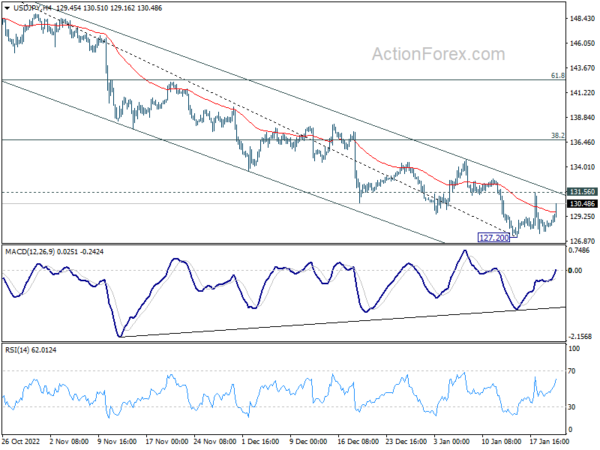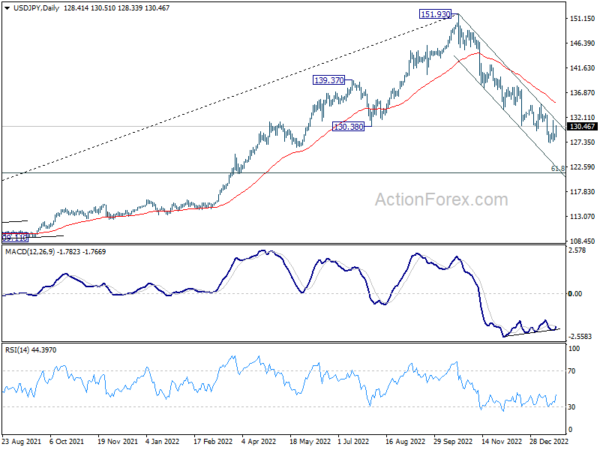Yen’s weakness continues into US session after BoJ Governor Haruhiko Kuroda repeated his dovish stance. Swiss Franc is also trading notably lower, reversing some of this week’s gains. Aussie, Kiwi are extending recovery but there is no clear upside momentum. For the week, Sterling is still the strongest, followed by Swiss Franc while Yen is the worst, followed by Aussie.
In Europe, at the time of writing, FTSE is up 0.17%. DAX is up 0.41%. CAC i up 0.56%. Germany 10-year yield is up 0.0735 at 2.138. Earlier in Asia, Nikkei rose 0.56%. Hong Kong HSI rose 1.82%. China Shanghai SSE rose 0.76%. Singapore Strait Times rose 0.54%. Japan 10-year JGB yield rose 0.0008 to 0.404.
Canada retail sales down -0.1% mom in Nov
Canada retail sales decreased -0.1% mom to CAD 61.8B in November, better than expectation of -0.5% mom. Core retail sales, excluding gasoline stations and motor vehicle and parts dealers, decreased -1.1% mom, largest decline in 11 months.
Sales declines in 6 of 11 subsectors, representing 47.4% of retail trade. The decrease was led by lower sales at food and beverage stores (-1.6%) and building material and garden equipment and supplies dealers (-3.8%).
Advance estimate indicates that sales rose 0.5% mom in December.
ECB Lagarde: Stay the course is my mantra for monetary-policy purposes
ECB President Christine Lagarde said, “We have to also stay that course of resilience that we observed in 2022. Stay the course’ is my mantra for monetary-policy purposes.”
“I hope that in 2023 fiscal policy will not work in a counter-cyclical way to monetary policy,” she said. “We don’t need to be pushed to do more than is necessary.”
Lagarde also noted that China’s reopening “will have inflationary pressure on many of us, simply because the level of energy that was consumed by China last year was certainly less than what they will consume this year, the amount of LNG that [they] will be buying from the rest of the world will be higher than what we have seen and there is not so much spare capacity in terms of oil and gas.”
“So there will be constraints, there will be more inflationary pressure coming out of that added demand,” she added.
SNB Jordan: Focus on price stability absolutely essential
SNB Chairman Thomas Jordan said,”inflation is far too high. It is negative not only for the functioning of the economy, it is very negative especially for lower income classes.”
“The population doesn’t like inflation, so … the focus on price stability for central banks is absolutely essential.”
Businesses “don’t hesitate any more to increase their prices,” the said. “That is different to two or three years ago, and that is also a signal it is not that easy to bring inflation back to 2%.”
“Once inflation is high, the pressure coming from wages is here and it is proof it will not be that easy everywhere to bring inflation down quickly,” he said.
UK retail sales volume down -1.0% mom in Dec, value down -1.2% mom
UK retail sales volume declined -1.0% mom in December, much worse than expectation of 0.4% mom. Ex-fuel sales dropped -1.1% mom, below expectation of 0.4% mom. Sales value decreased -1.2% mom while ex-fuel sales value declined -1.0% mom.
Between 2021 and 2022, retail sales volume fell by -3.0%, “as the lifting of restrictions on hospitality led to a return to eating out, and rising prices and the cost of living affected sales volumes.”
BoJ Kuroda defends extremely accommodative monetary policy
BoJ Governor Haruhiko Kuroda defended this week decision to maintain by the -0.1% interest rate and the 0.5% 10-year JGB yield cap.
“We expect, probably from February this year, inflation rates start to decline and fiscal year 2023 as a whole, inflation rate will be less than 2%. So, we decided to maintain the current extremely accommodative monetary policy for the time being,” he said.
“Our hope is that wages start to rise and that could make 2% inflation target to be met in a stable and sustainable manner, but we have to wait for some time,” he added.
Asked whether he had any regrets during reign, he said, “All in all, the government’s policy, coupled with the BoJ’s extremely accommodative policy, have been successful in changing Japan’s economic structure and growth prospects”.
“But our 2% inflation target has not been achieved in a sustainable, stable manner,” he said. “That is the only regret I have”.
Japan CPI core rose to 4% yoy in Dec, highest since 1981
Japan CPI core (all items ex-fresh food) accelerated from 3.7% yoy to 4.0% yoy in December, matched expectations. That’s also the highest level in four decades since 1981. CPI core-core (all items ex-food and energy) also accelerated from 2.8% yoy to 3.0% yoy, hitting the highest level since 1991. Headline inflation rose from 3.8% yoy to 4.0% yoy.
Food prices jumped 7.4% while energy prices rose 15.2%. “The impact on CPI from higher energy prices was large in 2022 but contributions from food prices are now bigger,” a government official said.
NZ BusinessNZ manufacturing unchanged at 47.2, further slippage expected in Q1
New Zealand BusinessNZ Performance of Manufacturing Index was unchanged at 47.2 in December. Looking at some details, production ticked up from 49.5 to 49.7. Employment rose from 46.9 to 48.8. New orders rose from 42.2 to 46.1. Finished stocks dropped from 55.5 to 50.1. Deliveries dropped from 49.6 to 48.4.
BNZ Senior Economist, Doug Steel stated that the latest PMI result “broadly fits with the clear decline we already expect for manufacturing GDP in Q4 with further slippage expected in Q1”.
USD/JPY Mid-Day Outlook
Daily Pivots: (S1) 127.13; (P) 129.35; (R1) 131.14; More…
USD/JPY is still bounded in established range despite today’s strong recovery. Intraday bias remains neutral first. On the upside, break of 131.56 minor resistance should confirm short term bottoming at 127.20. Intraday bias will be back on the up for stronger rebound to 38.2% retracement of 151.93 to 127.20 at 136.64. On the downside, though, firm break of 127.20 will resume larger fall from 151.93 to 121.43 fibonacci level next.
In the bigger picture, the firm break of 55 week EMA (now at 131.59) raises the chance of medium term bearish reversal, but that’s not confirmed yet. Strong support could be seen around 61.8% retracement of 102.58 to 151.93 at 121.43 and 38.2% retracement of 75.56 to 151.93 at 122.75 to bring rebound. But break of 134.76 resistance is needed to indicate bottoming first. Otherwise further fall will remain in favor.
Economic Indicators Update
| GMT | Ccy | Events | Actual | Forecast | Previous | Revised |
|---|---|---|---|---|---|---|
| 21:30 | NZD | Business NZ PMI Dec | 47.2 | 47.4 | 47.2 | |
| 23:30 | JPY | National CPI Y/Y Dec | 4.00% | 4.40% | 3.80% | |
| 23:30 | JPY | National CPI Core Y/Y Dec | 4.00% | 4.00% | 3.70% | |
| 23:30 | JPY | National CPI Core-Core Y/Y Dec | 3.00% | 2.90% | 2.80% | |
| 00:01 | GBP | GfK Consumer Confidence Jan | -45 | -41 | -42 | |
| 07:00 | GBP | Retail Sales M/M Dec | -1% | 0.40% | -0.40% | -0.50% |
| 07:00 | GBP | Retail Sales Y/Y Dec | -5.80% | -4.20% | -5.90% | -5.70% |
| 07:00 | GBP | Retail Sales ex-Fuel M/M Dec | -1.10% | 0.40% | -0.30% | |
| 07:00 | GBP | Retail Sales ex-Fuel Y/Y Dec | -6.10% | -4.40% | -5.90% | -5.60% |
| 07:00 | EUR | Germany PPI M/M Dec | -0.40% | -1.20% | -3.90% | |
| 07:00 | EUR | Germany PPI Y/Y Dec | 21.60% | 20.80% | 28.20% | |
| 13:30 | CAD | Retail Sales M/M Nov | -0.10% | -0.50% | 1.40% | 1.30% |
| 13:30 | CAD | Retail Sales ex Autos M/M Nov | -0.60% | -0.90% | 1.70% | 1.60% |
| 15:00 | USD | Existing Home Sales M/M Dec | 3.95M | 4.09M |


